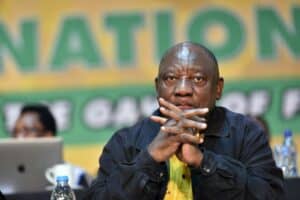Deputy Chief Justice Zondo has lambasted journalists for releasing witness affidavits ahead of testimonies, while allegations have been made that reporters have been on Bosasa's bribes payroll.

The Zondo commission of inquiry into allegations of state capture is bound to investigate allegations that some journalists were bribed to cover up corruption or turn a blind eye to state capture, the commission said on Saturday.
The commission and the South African National Editors’ Forum (Sanef) had met to particularly discuss the regulations of the commission, the timing of the release of commission documents, and allegations of a list of paid journalists, commission acting secretary Peter Pedlar said in a statement.
Regulation 11 (3) of the regulations applicable to the commission was discussed in some detail, he said.
The regulation stated that “no person shall without the written permission of the chairperson – (a) Disseminate any document submitted to the commission by any person in connection with the inquiry or publish the contents or any portion of the contents of such document, or (b) Peruse any document, including any statement, which is destined to be submitted to the chairperson or intercept such document while it is being taken or forwarded to the chairperson”.
Sanef raised a number of concerns with this regulation, including the concern that it prohibited journalists from accessing documents already in the public domain. Sanef and the commission agreed to look at the legal implications of this issue and to take the matter further to ensure a careful balance between ensuring access to documents already in the public domain, and released by witnesses themselves, and further protecting the integrity of the commission’s work and processes, he said.
In terms of the timing of the release of documents, Sanef raised the importance of journalists having access to the full set of witness documents, including annexures, at the start of a witness testimony to ensure in-depth and nuanced coverage of the issues.
The commission indicated that, as a general rule, it would release witness’ statements to the media when a witness had dealt with all matters covered in his/her statement. However, a special arrangement may be made for the chairperson of the commission to grant journalists accredited by the commission permission to have access to documents and witness statements prior to a witness giving evidence or finishing giving evidence. In such a case the chairperson would grant access on terms and conditions that he may stipulate.
Sanef also raised the damning allegation made that certain journalists were on the payroll of Bosasa to ensure positive coverage of the organisation.
Sanef raised the serious dangers of this allegation in terms of casting aspersions on the journalism profession as a whole. The commission informed Sanef that, as the evidence suggested that payments were made to journalists as bribes to cover up corruption or turn a blind eye to state capture, the commission was bound to investigate this matter further as part of its work.
Sanef welcomed this and asked members of the public to forward any information they may have to the commission, Pedlar said.
– African News Agency (ANA)
For more news your way, download The Citizen’s app for iOS and Android.






